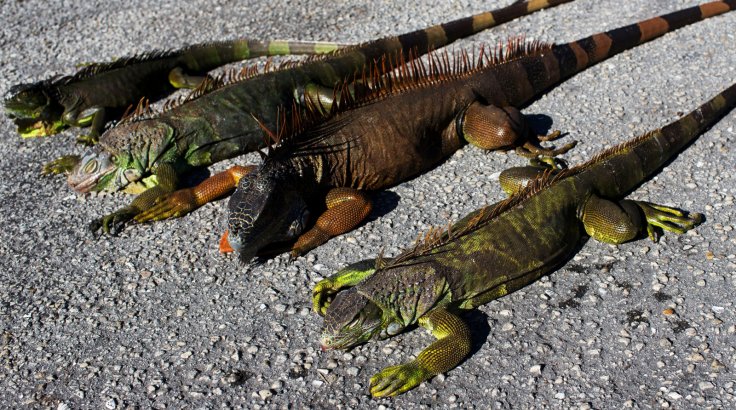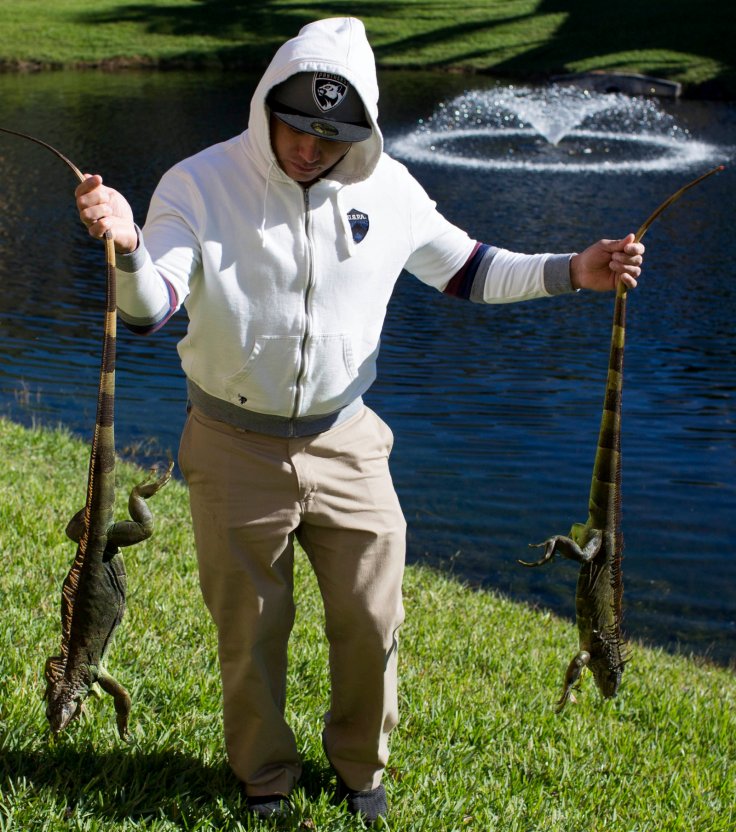
Iguanas in Florida are falling from their trees as temperatures dipped below 40 degrees Fahrenheit or 4 degree Celsius on Thursday, January 4. This temperature is fatal enough to freeze iguanas and eventually kill them. National Weather Service in Miami states that similar incidents have been reported in parts of South Florida.
People residing in these areas or those who have witnessed the situation took to social media to post pictures of the same and spread awareness. Frank Cerabino for example, Palm Beach Post columnist, tweeted a photo of a frozen iguana lying next to his swimming pool.
CBS News affiliate WPEC-TV posted photos of iguanas on a Palm Beach County road. Reporter Maxine Bentzel, states that the iguanas can survive only if they are moved in the sun. Many however feel that it is better to keep away from the frozen iguanas, those which are not dead as once they warm up, they might bite out of fear. "Don't assume that they're dead," said Kristen Sommers, who is a part of the wildlife program for the Florida Fish and Wildlife Conservation Commission.

Iguanas are cold-blooded creatures and are natives of South and Central America. These creepy-crawlies started stiffening up once the temperatures fell below 50 degrees Fahrenheit. Sommers further stated that temperature dropping below 50 degrees can freeze iguanas up. Green iguanas are invasive species in Florida. These creatures are popular for digging up holes and eating through the landscapes. They end up digging burrows beneath infrastructures. Their droppings are the main source of salmonella bacteria that causes intestinal infection. The creatures can grow up to 5 feet long.
The wildlife commission has stepped in to train people how to capture or manage iguanas. They believe that since the creatures are freezing and falling off from their perches, it might be easier to catch them. Sommers said that the creatures need to be euthanized before they warm up and start moving again.
Looks like winters aren't that favourable for the animal kingdom. The incidents of the iguanas are not the sole cases. Sea turtles are also stiffening up due to the cold climate. The wildlife commission's biologists are rescuing frozen sea turtles, floating lifelessly on water bodies or near the shore. Unfortunately, no such steps have been taken to rescue these iguanas.
Similar incidents occurred in 2010 when temperatures went below 40 degrees Fahrenheit. It killed off many iguanas, Burmese pythons and other invasive species of South Florida. Effects of the winter storm were less horrific for those living in other parts of Florida. For the first time in 28 years, it snowed in the state's capital, Tallahassee briefly on Wednesday.
The frigid weather in the US is turning out to be painful for all it seems. The chilly weather is turning out to be fatal for the sharks near Cape Cod Bay. The incidents are taking place in the Northern US as lifeless bodies of these marine creatures are emerging on the beaches. The pictures of dead sharks went viral on social media, horrifying people worldwide.









